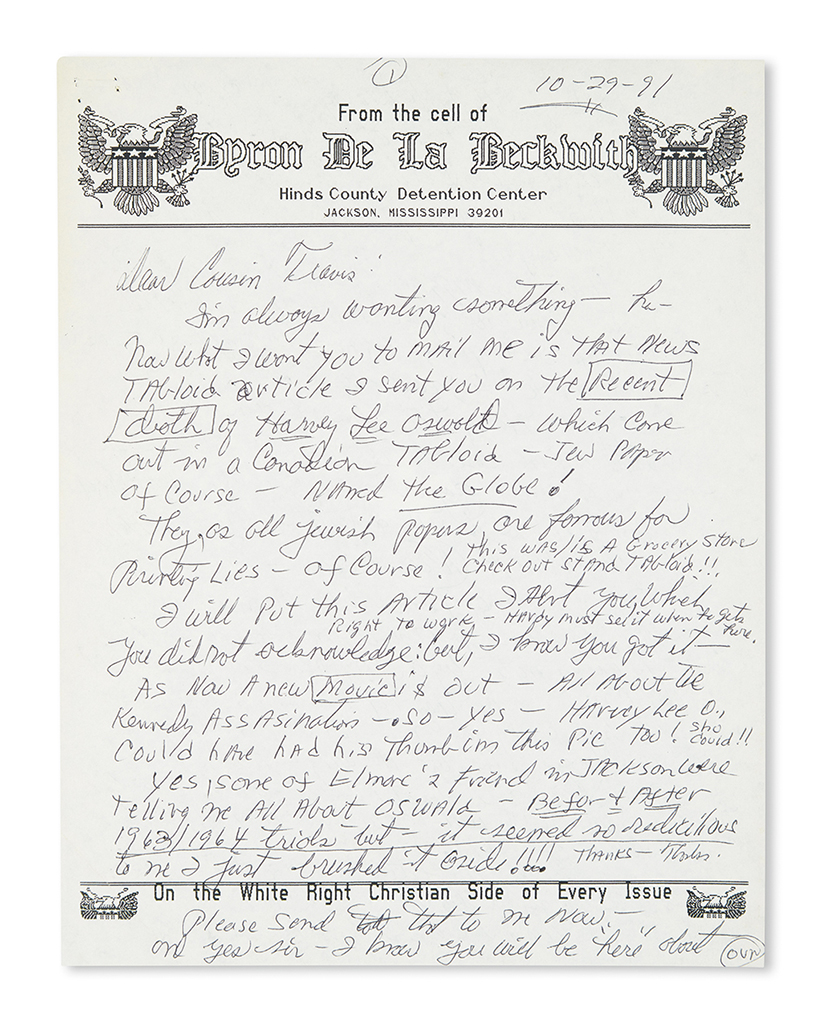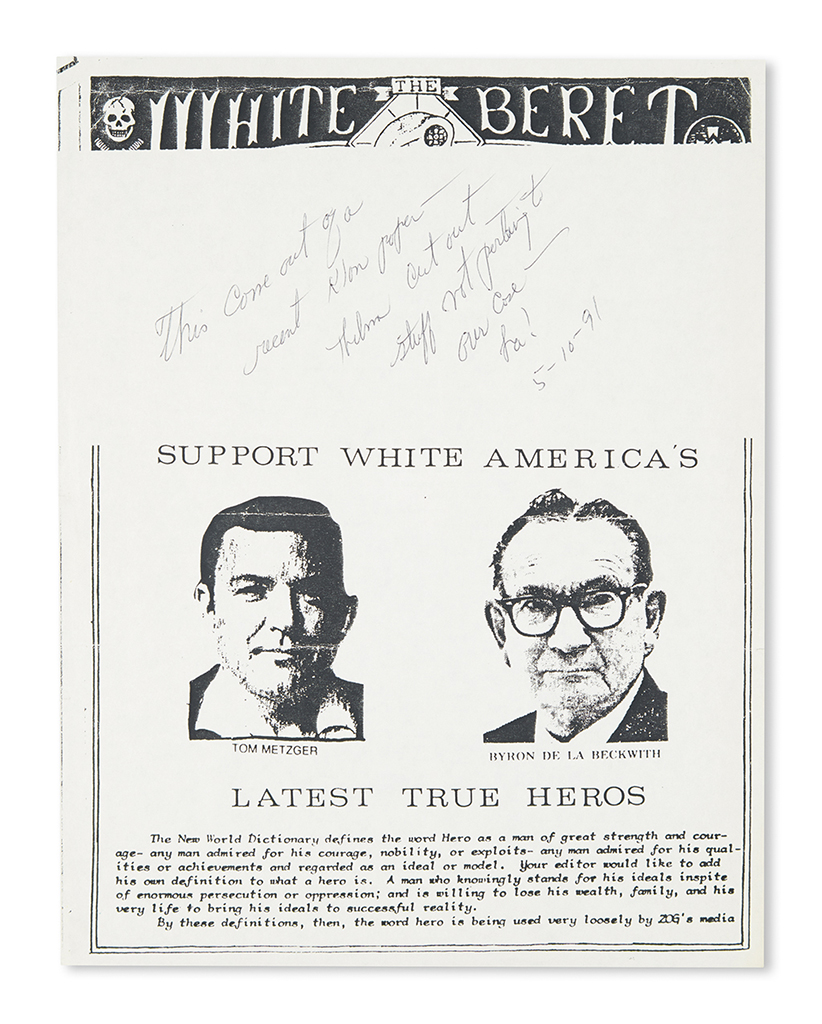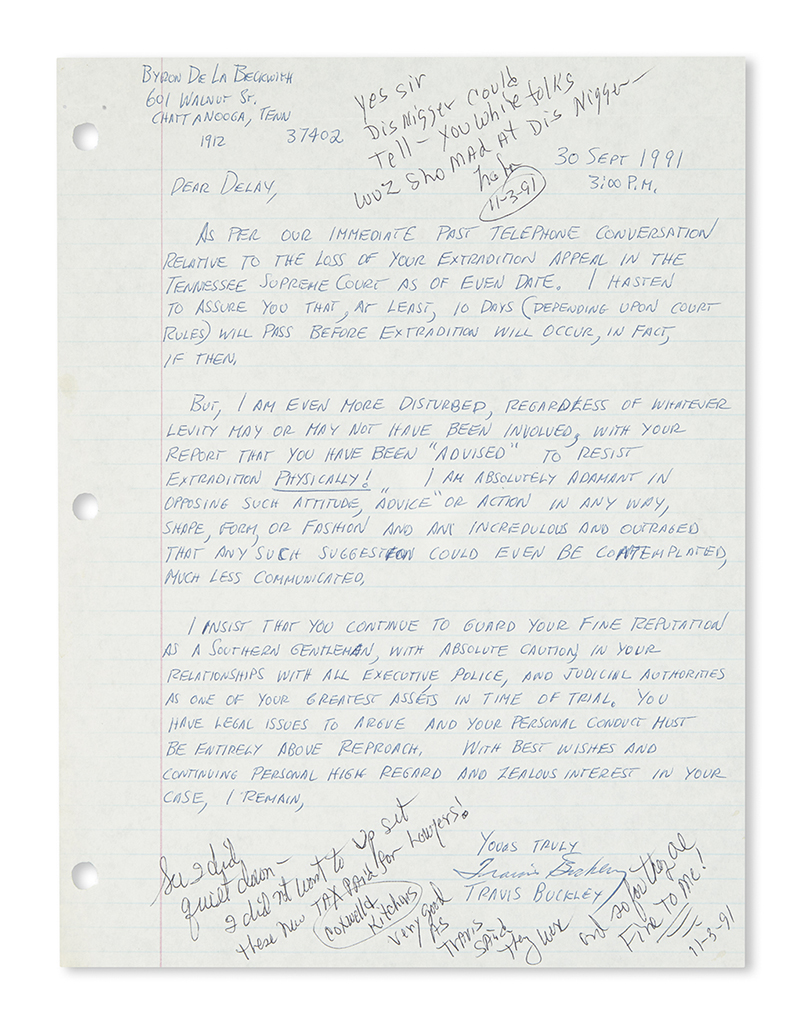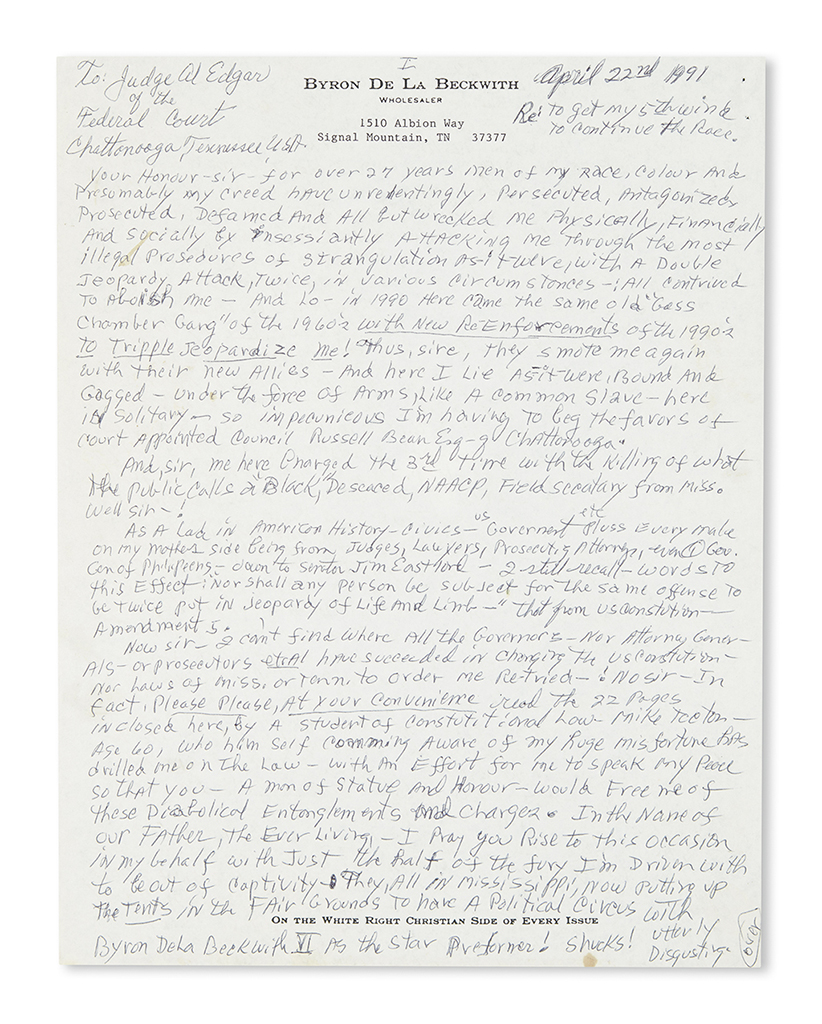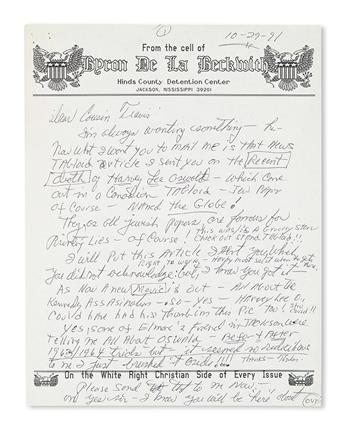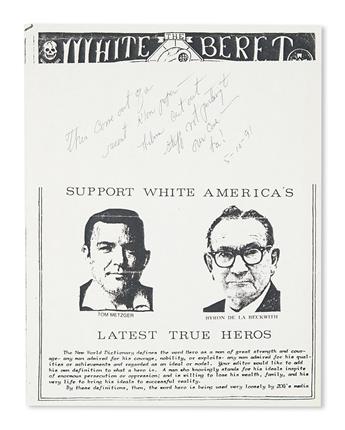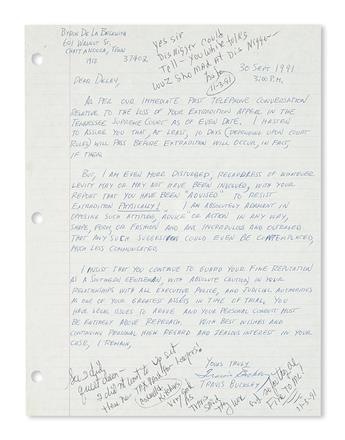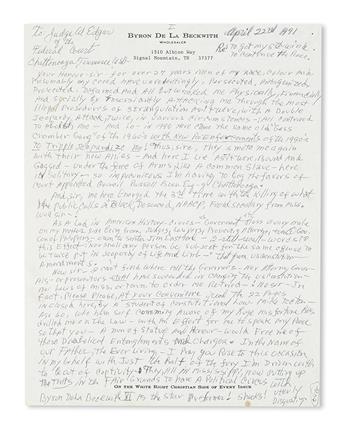Sale 2444 - Lot 90
Price Realized: $ 4,200
Price Realized: $ 5,250
?Final Price Realized includes Buyer’s Premium added to Hammer Price
Estimate: $ 4,000 - $ 6,000
(CIVIL RIGHTS.) Legal file on Byron De La Beckwith (the killer of Medgar Evers), kept by his advisor Travis Buckley. More than 100 documents (0.5 linear feet) including original letters, memoranda, and photocopies of court documents and legal research, with Buckley's original overstuffed accordion folder (worn and repaired with tape); condition generally strong. Vp, 1990-98 (bulk 1991)
Additional Details
The great civil rights leader Medgar Evers (1925-1963) served as a sergeant in World War Two, then rose to national prominence as an activist in the 1950s, helping to integrate the University of Mississippi and investigating the Emmett Till case. This attracted the attention of Mississippi's White Citizens Council. Evers survived two assassination attempts, but was killed by a sniper's bullet on 21 June 1963.
Byron De La Beckwith was arrested for the murder, but two all-white juries failed to convict him. He relocated to Tennessee and enjoyed decades of freedom, broken only by a stint in jail in the late 1970s for conspiring to murder a Jewish activist in an unrelated case. By 1990, enough new evidence on the Evers shooting was unearthed to bring him to trial once more. He was extradited to Mississippi in October 1991, convicted in 1994, and lost his final appeal in 1997; he died a prisoner in 2001. The story of the trial was dramatized in the 1996 Hollywood film Ghosts of Mississippi.
Beckwith's lawyer in the earlier trials was Travis Buckley (1934-1999), who represented several Mississippi KKK members in various trials over his career. Beckwith was assigned a pair of court-appointed lawyers for the third trial, but Buckley (apparently working for a modest fee) consulted regularly with him by mail. Offered here is Buckley's file on this third and final trial, mostly from the 1991 extradition proceedings, including numerous letters and notes from Beckwith, as well as photocopies of court documents, copies of some outgoing correspondence, and letters from other sympathetic parties. Beckwith often wrote his messages on Post-It notes, or on sheets of used paper: incoming letters from Buckley and others, photocopied newsletters of various white supremacist groups, and scrap paper. He occasionally used his own letterhead: "Byron de la Beckwith, Wholesaler . . . On the White Right Christian side of every issue." We count 60 separate items with letters or notes in Beckwith's hand. Almost all of them are from Tennessee between January and October 1991, with a few undated, and single notes from 1992 (from a detention center in Mississippi) and 1998.
The content of the letters is consistently disturbing. His 22 April 1991 draft letter to a Tennessee judge complains that "In 1990 here came the same old gass chamber gang of the 1960s . . . and here I lie as it were, bound and gagged, under the force of arms like a common slave, here in solitary." On 10 May 1991, he jotted a note on a KKK publication, the White Beret, featuring a story on his case. A note dated 21 May is written on an American Nazi Party leaflet: "Dear Travis, I get arms full of stuff like this, from folks like this. Whenever they send 5.00, good. I use it on our current needs and I ask for more!"
Among the other papers are scattered post-1991 correspondence on the case with defense attorney Merrida Coxwell and others through 1994; photocopies of various motions, rulings, and appeals, a photocopy of the court docket from the original 1963-64 trial; and Beckwith's signed property receipt from Hamilton County Jail dated 31 December 1990. The noted white supremacist and murderer Sam Bowers was an ally. A photocopy of his long 6 May 1991 letter to Beckwith is included in the collection, offering legal advice, signed using his pseudonym J. Worthington Bancroft. Buckley's original case folder is also included, inscribed with the names of Beckwith's public defenders. This archive offers an inside perspective on a nationally significant civil rights trial, a story well worth preserving for future generations of researchers. Provenance: sold by the Buckley family to a third party, then sold to the consignor.
Byron De La Beckwith was arrested for the murder, but two all-white juries failed to convict him. He relocated to Tennessee and enjoyed decades of freedom, broken only by a stint in jail in the late 1970s for conspiring to murder a Jewish activist in an unrelated case. By 1990, enough new evidence on the Evers shooting was unearthed to bring him to trial once more. He was extradited to Mississippi in October 1991, convicted in 1994, and lost his final appeal in 1997; he died a prisoner in 2001. The story of the trial was dramatized in the 1996 Hollywood film Ghosts of Mississippi.
Beckwith's lawyer in the earlier trials was Travis Buckley (1934-1999), who represented several Mississippi KKK members in various trials over his career. Beckwith was assigned a pair of court-appointed lawyers for the third trial, but Buckley (apparently working for a modest fee) consulted regularly with him by mail. Offered here is Buckley's file on this third and final trial, mostly from the 1991 extradition proceedings, including numerous letters and notes from Beckwith, as well as photocopies of court documents, copies of some outgoing correspondence, and letters from other sympathetic parties. Beckwith often wrote his messages on Post-It notes, or on sheets of used paper: incoming letters from Buckley and others, photocopied newsletters of various white supremacist groups, and scrap paper. He occasionally used his own letterhead: "Byron de la Beckwith, Wholesaler . . . On the White Right Christian side of every issue." We count 60 separate items with letters or notes in Beckwith's hand. Almost all of them are from Tennessee between January and October 1991, with a few undated, and single notes from 1992 (from a detention center in Mississippi) and 1998.
The content of the letters is consistently disturbing. His 22 April 1991 draft letter to a Tennessee judge complains that "In 1990 here came the same old gass chamber gang of the 1960s . . . and here I lie as it were, bound and gagged, under the force of arms like a common slave, here in solitary." On 10 May 1991, he jotted a note on a KKK publication, the White Beret, featuring a story on his case. A note dated 21 May is written on an American Nazi Party leaflet: "Dear Travis, I get arms full of stuff like this, from folks like this. Whenever they send 5.00, good. I use it on our current needs and I ask for more!"
Among the other papers are scattered post-1991 correspondence on the case with defense attorney Merrida Coxwell and others through 1994; photocopies of various motions, rulings, and appeals, a photocopy of the court docket from the original 1963-64 trial; and Beckwith's signed property receipt from Hamilton County Jail dated 31 December 1990. The noted white supremacist and murderer Sam Bowers was an ally. A photocopy of his long 6 May 1991 letter to Beckwith is included in the collection, offering legal advice, signed using his pseudonym J. Worthington Bancroft. Buckley's original case folder is also included, inscribed with the names of Beckwith's public defenders. This archive offers an inside perspective on a nationally significant civil rights trial, a story well worth preserving for future generations of researchers. Provenance: sold by the Buckley family to a third party, then sold to the consignor.
Exhibition Hours
Exhibition Hours
Aliquam vulputate ornare congue. Vestibulum maximus, libero in placerat faucibus, risus nisl molestie massa, ut maximus metus lectus vel lorem.



